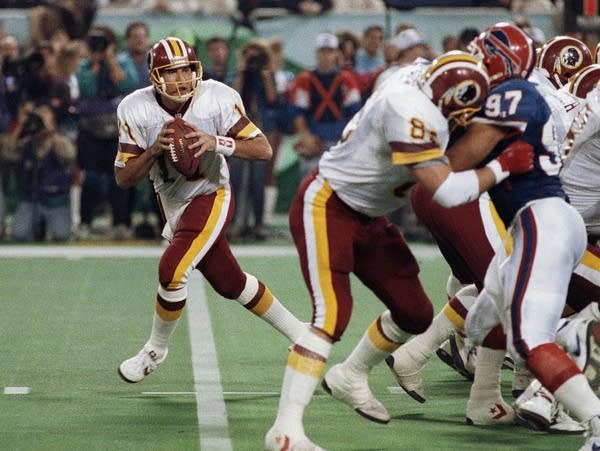From the archives: Story of 1992 Super Bowl protest could have been written today

Throughout 2017, Minnesota Public Radio will celebrate 50 years on the air by sharing highlights from our archives, connecting Minnesota's past to its present. | This story, by MPR News reporter Catherine Winter, originally aired Jan. 27, 1992.
The records, commercials and halftime show of Super Bowl LI are over, but it's less than a year till the eyes of the nation are focused on Minneapolis.
Create a More Connected Minnesota
MPR News is your trusted resource for the news you need. With your support, MPR News brings accessible, courageous journalism and authentic conversation to everyone - free of paywalls and barriers. Your gift makes a difference.
MPR marks 50 years
• More stories from the archives
• Join the celebration, tell us your story
Feb. 4, 2018, will mark the second time the city has hosted the big game. When National Football League teams from Buffalo, N.Y., and Washington, D.C., played in Super Bowl XXVI at the Metrodome in 1992, thousands protested the use of the name "Redskins" for a sports team.
Washington's mascot hasn't changed in the 25 years since, and protests in Minneapolis have continued as recently as 2014, when the Vikings played host to the Washington team.
MPR News reporter Catherine Winter covered the protest in 1992. (Be advised that the story contains offensive language.)

"We welcome all you good Washington football fans, but we don't welcome the chicken feathers, the paint, the cheap Hollywood chants," American Indian Movement leader Vernon Bellecourt told the crowd outside the Metrodome.
"Come as you are, don't come as what you think we are. Leave our culture, leave our spiritual traditions alone."
Bellecourt, who died in 2007, was a member of the White Earth Band of Ojibwe and a Native American rights activist. He was joined that day by an estimated 3,000 protesters, who gathered outside the Metrodome stadium as football fans streamed in for the game.
"We understand that it's going to take a little time before you understand that the headdress is reserved for our most respected and revered chiefs and spiritual leaders," Bellecourt called out to the football fans as they passed by the demonstrators.
While few football fans confronted — or even engaged with — the protesters as they passed them, many said they couldn't understand why the mascot caused such offense:
"We're here to have a good time, and it's not going to spoil our time. It's not going to spoil the fun that we have," one fan said.

"They need to lighten up," said another.
And another: "There was nothing offensive meant when they took the name. ... Maybe it was meant to be an honor?"
Bellecourt and his fellow demonstrators disagreed.
"The chicken feathers have to go," he told the crowd. "The war paint is for our great ceremonies, our very sacred and revered ceremonies. When you put the paint on your face, you dishonor us and you dishonor yourself."